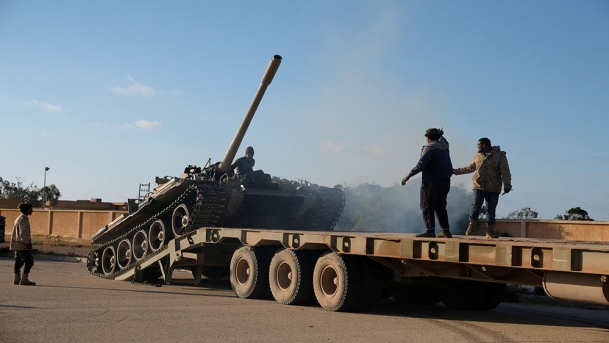
Khalifa Haftar’s offensive against Tripoli came as a complete surprise. Preparations for the offensive appear to have been underway even as Abu Dhabi was brokering an understanding between the general and Fayez al-Sarraj, the head of the Presidential Council, in the run-up to the UN-sponsored National Forum, organised to bring a political settlement to Libya. Haftar’s assault upended these efforts, pushing the crisis in Libya to a level that could be hard to contain.
Mimicking the tactics of his 2014 offensive on Benghazi, Haftar organised a large force advancing on the capital from the east and south combined with a coordinated, rapid assault by supporting militias to the west and south of Tripoli.
The main offensive force reached Gharyan, about 100 kilometres southwest of Tripoli then advanced rapidly to the outskirts of the capital. Meanwhile, a force from the south engaged with resistance forces in the Wadi al-Rabia area, just 30 kilometres from the heart of the city. A third prong of the attack set out from coastal cities to the west of Tripoli and managed to reach Gate 27, the closest point to the city taken by the offensive forces. The fourth axis of the attack focused on the Qasr area between Ghashir and the airport, located 30 kilometres from the centre of Tripoli.
The response from the National Accord government and its supporting forces was swift and effective. They successfully immobilised the force coming from the west along the coast without substantial fighting on the first day. After skirmishes in the Qasr area, the Tripoli forces managed to eject the offensive force from the airport. Most importantly, the main attack from Gharyan was repelled; defence forces prepared for further attempted incursions toward the capital and readied for a counterattack on Gharyan. There has been fierce fighting in recent days along the final axis in the Wadi al-Rabia area, but the defensive forces held the line, preventing Haftar’s forces from making further inroads.
Despite the surprise nature of the offensive, Tripoli’s response was effective, for several reasons. Throughout 2017 and 2018, three military zones were established under the Accord Government with coordination between the areas. Support from the Tripoli Protection Force and many fighters from Western cities, most significantly the superior fighting force of Misrata, was also key in repelling the attack. A third factor is that the defensive forces interrupted the supply the lines of Haftar’s forces, taking control of important points south of Sirte. Control of these positions also prevented Haftar from making effective use of airpower.
Internal social pressure could further weaken Haftar. The longer the fighting continues and the greater the casualties, the more areas and tribes in western Libya will press for an end to the war to preserve social cohesion. This could even spur some of Haftar’s supporting tribal forces to withdraw. Rising international pressure could also lead Haftar to cease hostilities and retreat.
Given this, it is likely that Haftar’s offensive to take the capital will fail. This may have social ramifications in areas in western Libya in which some brigades and cities supported or participated in the offensive. Faced with a failed offensive and weakened political influence, Haftar may decide to focus his efforts on eastern Libya, which would give added impetus to partition and deepen existing divisions.
A failure will also significantly weaken Haftar’s position and influence. His military alliances with groups in the east and south may unravel. Regional and international backing for Haftar will similarly flag, his allies having been severely embarrassed by his refusal to heed the UN secretary-general’s call for a ceasefire. If Haftar finds himself embattled locally and internationally and facing military and political sanctions, previously restrained voices in the parliament may also be emboldened to pressure him to reconsider his position toward the Accord Government.
At the same time, important political and military forces in western Libya, which even before the war opposed Haftar’s participation in any political settlement, will be vindicated. With trust in him shattered, it will be difficult, if not impossible, to accommodate proposals to involve him in the political agreement.
______________________________________________________________